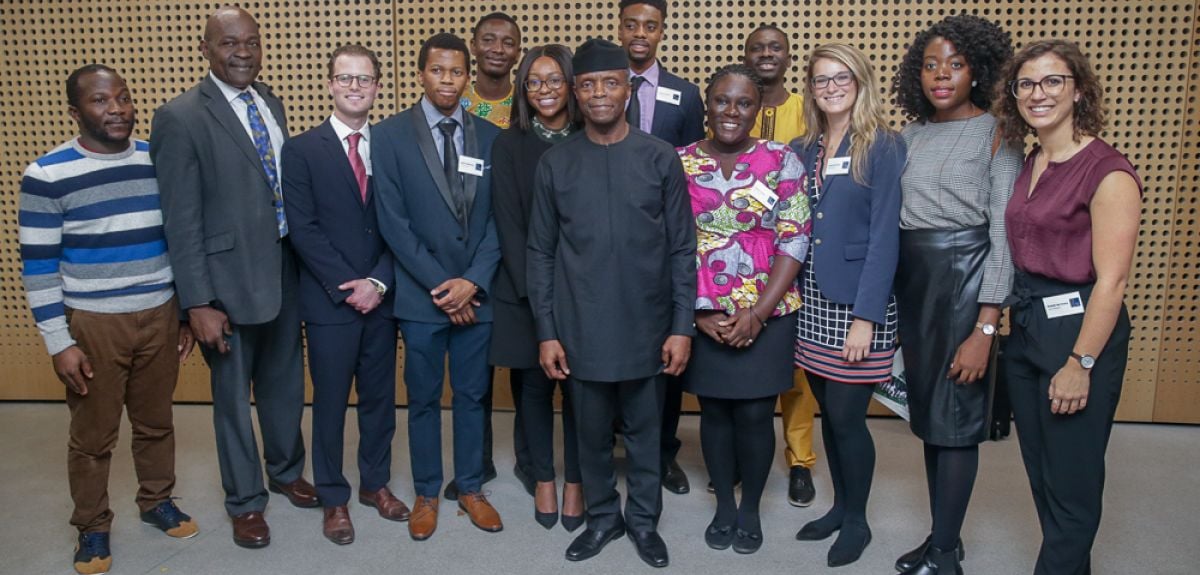
Nigerian Vice President visits Oxford’s African Studies Centre
Professor Yemi Osinbajo, Vice President of Nigeria, has visited the African Studies Centre (the Centre), at the Oxford School of Global and Area Studies, Oxford University.
The Vice President attended the Centre for the inauguration of its International Advisory Board (IAB).
The Centre is one of the world’s leading centres of African Studies. Since opening its doors in 2004 the centre has built a reputation for its graduate level work and faculty research on Africa.
Vice President Osinbajo is an accomplished scholar, teacher, lawyer and administrator. He has held various professorial, government and UN positions, and is a leading expert on the Law of Evidence, National and Regional Corporate Commercial Laws, and Public Law.
As part of the proceedings he delivered a lecture addressing the challenges of higher education in Africa, entitled ‘The Challenges of Human Development in 21st Century Africa. Vice President Osinbajo said: ‘I am deeply honoured to have been invited to speak here today. Although clearly, Oxford’s study of Africa is decades ahead of the 2004 establishment of the Centre, it is commendable indeed that the African Studies Centre has, in a few short years, become one of the world’s leading centres of African Studies. But this Centre’s role in the shaping of policy and ideas is bound to become more crucial as Africa enters possibly its most decisive two decades.
‘It is evident that there are at least four important respects that Africa will hold the balance of world development in the next two decades. The first is in world population: demography. The second is environment and climate change. The third is in production, especially agriculture, manufacturing and technology. And the fourth is in social exclusion, under which rubric comes poverty and human capital development, and its implications for global security. Africa’s failure or success on these issues will profoundly impact the fortunes of mankind. The challenges of human development in Africa are clearly enormous, but so are the opportunities. And if we keep our focus, especially on good governance, the next two decades may truly be the African decades.’
The Centre is currently working to establish stronger ties with African governments, as well as industry leaders and influencers from the business sector to the arts.
Prof Wale Adebanwi, Rhodes Professor of Race Relations and Director or the African Studies Centre, said: 'The University of Oxford's African Studies Centre is happy to welcome the Vice President of Nigeria at a time when the Centre is strengthening its position as a global centre for the study of Africa while expanding opportunities for more African students - as well as students from everywhere in the world - to study in Africa in the oldest university in the English-speaking world. The Vice President also inaugurated our new International Advisory Board (IAB) made up of global leaders, achievers and entrepreneurs from Africa who will help in providing more opportunities for supporting students from Africa to study at Oxford.’
The Centre’s IAB is composed of a distinguished group of accomplished Africans and friends of Africa who are committed to promoting advanced study of the continent and its relationship with the wider world. Its principal purpose includes supporting talented students from Africa and the African Diaspora to study at the ASC, and fostering links between the ASC and institutions and organisations in Africa and elsewhere.
The board will be chaired by Mr Tito Mboweni, the first black South African to lead the South African Reserve Bank and former Minister of Labour in President Nelson Mandela’s Cabinet. Mboweni is also a founding member of Mboweni Brothers Investment Holdings in South Africa and an International Advisor of Goldman Sachs International. He was also recently appointed as South African Minister of Finance.
The IAB’s other eight members, who met as a Board for the first time prior to Osinbajo’s lecture include:
• Madame Monica Geingos – Lawyer and First Lady of the Republic of Namibia
• Mr Gareth Ackerman – Chairman, Pick’n Pay, South Africa
• Professor Ibrahim Gambari – Former UN Under-Secretary for Political Affairs, former Nigerian External Affairs Minister and, most recently, Commonwealth Secretary General’s Special Envoy to Zambia
• Dr Charlotte Scott – Former First Lady of Zambia, Oxford alumna
• Governor Nasir El-Rufai – Quantity Surveyor, Management Consultant and current Governor of Kaduna State, Nigeria
• Ms Linda Mabhena-Olagunju – Founder and Managing Director, DLO Energy Group (Pty) Ltd, South Africa
• Mr Alex Duncan – Development practitioner, consultant economist and Director, Policy Practice, UK
• Mr Ivor Agyeman-Duah – Economist and author, Accra, Ghana
 New study on Amazonia's fire crises urges action ahead of the next burning season
New study on Amazonia's fire crises urges action ahead of the next burning season
 New heart disease calculator could save lives by identifying high-risk patients missed by current tools
New heart disease calculator could save lives by identifying high-risk patients missed by current tools
 Modern Slavery and Human Rights Policy and Evidence Centre moves to Oxford University after receiving continuation funding
Modern Slavery and Human Rights Policy and Evidence Centre moves to Oxford University after receiving continuation funding
 Study shows that island bats are valuable allies for farmers
Study shows that island bats are valuable allies for farmers
 Study reveals how humanity could unite to address global challenges
Study reveals how humanity could unite to address global challenges